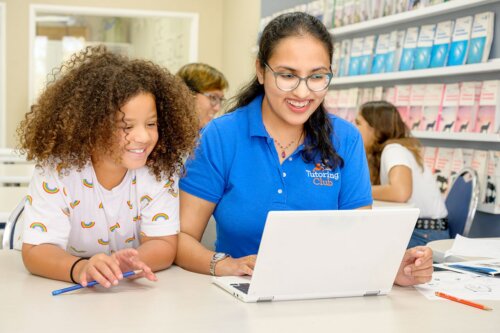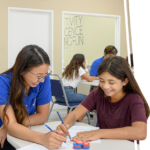Why Tutoring Is Key to Student Success at Tutoring Club of St Johns
Tutoring: A Path to Lasting Growth and Success

Find a tutor near me in St Johns FL
It can be hard to find tutors in your area. Sometimes, a student’s progress slows down. Homework might become a nightly struggle. Parents then seek real solutions. They want something that truly helps their child improve. This article explains why tutoring is a powerful, research-backed method. It closes learning gaps. It also speeds up mastery. Furthermore, it rebuilds student confidence for all K–12 grades.
You will learn how one-on-one tutoring in a learning center differs from classroom teaching. We will explore the learning processes that lead to better grades and motivation. You will also discover the study skills tutors teach. Finally, we will discuss which program types fit common needs. We compare different program models. We also summarize evidence connecting tutoring to real gains. Then, we explain how local providers like Tutoring Club of St Johns (Fruit Cove, FL) offer flexible support. As leading experts in personalized academic help, we are uniquely able to guide families. By the end, parents should understand tutoring‘s value. They will feel ready to take an informed next step with us.
How Personalized Tutoring Boosts K-12 Academic Performance
Personalized tutoring often happens in a learning center. Here, students work one-on-one or in small groups, usually up to four at a table. The process starts with a diagnostic assessment. This is a special test that finds out exactly what a student knows and doesn’t know. Next, tutors set a learning pace. This pace perfectly fits the student’s needs. Finally, they give specific feedback. This feedback helps close any skill gaps. Our assessment pinpoints the exact misconceptions a student has. It provides scaffolded practice. This means getting just enough help to do a task, then slowly doing more on your own. It also offers immediate corrective feedback. This means getting clear information about mistakes to fix them right away. This focused support leads to quicker mastery of missed concepts. It also results in stronger classroom performance. Students feel less stress about subjects that once frustrated them.
At Tutoring Club of St Johns, we see these principles in action daily. They truly transform student outcomes. Understanding how these parts work together shows why personalized tutoring often works better than general classroom reteaching.
What Are the Benefits of One-on-One Tutoring?
One-on-one tutoring provides focused attention. It offers customized pacing. You also get instant corrective feedback. These three things greatly boost understanding and memory. Tutors use short diagnostic tests to find misconceptions. Then, they plan lessons that revisit core ideas. They continue until the student truly understands them. This shrinks cumulative gaps. It also improves test results. The same approach lets a tutor speed up learning when a student is ready. They can offer enrichment beyond grade level. This keeps curiosity alive. This focused, individualized approach is key to our method at Tutoring Club of Johns Creek. It ensures every student gets the exact support they need to excel. Small, measurable wins build momentum. For example, correcting steps on a math problem or reading at grade-level fluency helps. This momentum sustains longer-term progress and engagement.
How Does Tailored Instruction Address Unique Learning Styles?
Tailored instruction matches teaching methods to how a student learns best. Some students are visual learners. Others are auditory or kinesthetic. Tutors use assessment data to focus on strategies that produce fast gains. For visual learners, tutors use diagrams and organizers. For auditory-learners, they use “think-alouds” and verbal scaffolds. These are verbal cues or prompts. Kinesthetic learners use hands-on tools and active problem-solving. Our instructors at Tutoring Club of St Johns are skilled at identifying these unique learning styles. They adapt lessons to resonate deeply with each student. Lessons also adjust task difficulty and feedback style. This makes tasks move from frustrating to achievable. Consequently, students stay motivated. These adjustments increase on-task behavior and participation. They accelerate skill growth. Ultimately, they support both grades and confidence.
How Tutoring Boosts Grades and Academic Confidence
Targeted tutoring creates both cognitive and affective gains. Cognitive gains are clear improvements in skills and grades. Affective gains are improvements in feelings or attitudes, like higher confidence and more participation. By closing gaps and tracking progress, tutors turn confusing topics into repeatable skills. These skills show up on quizzes, tests, and homework. Mastery plus positive reinforcement builds self-efficacy. This is your belief in your own ability to succeed. Students become more willing to tackle hard work in class. This powerful synergy between competence and confidence is what we cultivate at Tutoring Club of St Johns. It drives both academic achievement and a lifelong love for learning. That link between competence and confidence is why educators often recommend tutoring. It improves grades and long-term motivation.
What Evidence Shows Tutoring Leads to Improved Grades?
Recent reviews find consistent positive effects from tutoring, especially when instruction is frequent, diagnostic, and focused on specific weaknesses. High-quality tutoring uses assessments and regular practice. It produces the biggest gains. Many programs report steady improvements on unit tests and course grades after a few weeks. Studies also connect regular tutoring with better standardized-test outcomes. This happens when it combines content practice with strategy instruction. The consistent positive effects highlighted by research are precisely what we aim to deliver at Tutoring Club of Johns Creek. We do this through our diagnostic-driven and frequent instruction. Presenting evidence clearly helps parents compare options. They can see which approaches typically deliver the best academic returns.
|
Intervention Type
|
Typical Evidence/Metric
|
Typical Impact
|
|---|---|---|
|
Diagnostic one-on-one tutoring
|
Pre/post mastery checks and weekly progress reports
|
Targeted gap closure and grade improvement
|
|
High-frequency small-group tutoring
|
Unit test score comparisons over the term
|
Accelerated learning pace and better retention
|
|
Strategy-focused test prep
|
Practice test score trends
|
Improved standardized test performance
|
This table shows how matching the type of help to a student’s needs helps predict outcomes. Parents should choose intensity and focus based on the gap they want to close.
How Does Tutoring Build Student Confidence and Motivation?
Tutoring builds confidence by creating frequent, achievable wins. It also teaches clearer approaches to tasks. Tutors set scaffolded goals. They celebrate progress. They also teach students how to monitor their own learning. The tutor–student relationship offers supportive, constructive feedback. This happens in a lower-pressure setting than classroom drills. Consequently, it reduces anxiety. At Tutoring Club of St Johns, we prioritize creating this supportive environment. Small victories lead to significant leaps in self-belief and engagement. As students accumulate successes, their participation and intrinsic motivation rise. This creates a positive cycle. It improves classroom behavior and long-term engagement.
What Essential Study Skills Do Students Develop Through Tutoring?
Beyond subject content, effective tutoring teaches executive function and study habits. Executive-function skills are like your brain’s management system. They help you plan, organize, and manage your time. These habits include time management, organization, note-taking, and test strategy. They transfer across classes and grades. Tutors model planning techniques. They teach active study methods like retrieval practice and spaced review. Retrieval practice means actively trying to remember information without looking at notes. Spaced review means reviewing material over several days or weeks. They also provide checklists to make homework time more efficient.
These skills help students handle their workload. They cut down on procrastination. They also perform better on cumulative assessments. This compounds into stronger grades and college readiness over time. Tutoring Club of Johns Creek empowers students with critical executive-function and study habits. This ensures they become independent, proactive learners. The focus is on practical, repeatable habits. These habits shift students from reactive to proactive learners. These are especially important for students doing homeschooling.
Tutoring commonly emphasizes the following foundational study skills:
-
Time Management: Tutors teach scheduling and prioritization. This turns vague study time into focused, productive blocks.
-
Active Study Techniques: Students practice retrieval and spaced repetition. This boosts long-term retention, which is how well you remember information.
-
Organizational Strategies: Note-taking systems and task breakdowns lower cognitive load. This makes starting work easier.
These habits lead to smoother homework routines. They also create clearer study plans. This sets up the long-term benefits discussed next.
Which Study Habits and Time Management Skills Are Taught?
Tutors help students build daily and weekly routines. These routines balance practice and rest. They teach planners, project breakdowns, and prioritized to-do lists. They introduce active learning methods. These include self-quizzing, summarizing, and interleaving. Interleaving involves mixing different types of problems or subjects during study. These methods replace passive rereading. They also strengthen recall. Tutors model concise note-taking. They run time-limited practice sessions to build focus. These integrated study skills are a core part of our curriculum at Tutoring Club of St Johns. They are designed to transform how students approach their academic responsibilities. Together, these habits cut homework friction. They also raise study quality. This is why integrated study-skills instruction is a core part of effective tutoring
How Do These Skills Contribute to Long-Term Academic Success?
Study skills learned in elementary and middle school compound over time. They increase independence in high school. They also prepare students for college-level work. Early routines prevent last-minute cramming. They support steady progress. Active study habits lead to better standardized-test performance. They also lead to deeper retention of key concepts. Students who internalize planning and metacognitive strategies are more likely to self-advocate. Metacognitive strategies are ways to think about your own thinking. They help you understand how you learn best. These students manage complex projects. They sustain performance as academic demands grow. At Tutoring Club of St Johns, we know that these foundational skills are the bedrock of future academic and professional success. They extend the value of tutoring far beyond immediate grade improvements. Those long-term gains show that tutoring’s value extends well beyond immediate grade improvements.
What Tutoring Programs Are Available for K-12 Academic Growth in St Johns?
Local families in Northern St Johns, Fruit Cove, and Julington Creek areas typically find tutoring services focused on core subjects and key transitions. These include mathematics, early literacy, reading, writing, FAST prep, SAT/ACT prep, college planning, and homework support. Each program has distinct goals. Math targets concept mastery and problem-solving. Reading builds decoding (sounding out words) and comprehension (understanding what you read). Writing sharpens structure and clarity. Test prep blends content review with timing and strategy.
Tutoring Club of St Johns offers a comprehensive suite of local tutoring services with tutors nearby. They are designed to meet these diverse needs. This ensures every student finds their path to success. Comparing program features and expected outcomes helps parents pick the best path. It addresses their child’s current challenges. Below is a concise comparison to guide that choice.
|
Program
|
Focus Area
|
Outcome/Benefit
|
|---|---|---|
|
Math Tutoring
|
Concept mastery and problem solving
|
Stronger computational skills and improved test scores
|
|
Reading Tutoring
|
Phonics, fluency, comprehension
|
Better decoding and reading comprehension
|
|
Writing Tutoring
|
Structure, expression, grammar
|
Clearer written communication and improved essays
|
How Do Math, Reading, and Writing Tutoring Support Student Learning?
Math tutoring breaks concepts into manageable steps. It targets misconceptions with focused practice. It also teaches problem-solving strategies. These strategies transfer to new problems. Reading tutoring usually starts with diagnostic tests for decoding and fluency. Reading fluency means reading smoothly and accurately at a good pace. Then, it uses guided reading and comprehension strategies for the English language. These strengthen inference (figuring out unstated things) and retention. Writing tutoring emphasizes planning, sentence-level skills, and revision techniques. These produce clearer, more persuasive work. At Tutoring Club of St Johns, our specialized programs in Math, Reading, and Writing are meticulously designed. They address these areas. This ensures comprehensive skill development. This ensures gains from sessions carry into the classroom and home.
What Are the Advantages of SAT/ACT Test Preparation and College Planning?
SAT/ACT prep blends diagnostic testing, concentrated content review, and strategy work. It clarifies question types and timing. Practice tests show score trends. They also guide focused study. College planning provides timelines. It offers course-selection advice. It also gives an application strategy. This aligns a student’s coursework with postsecondary goals. Tutoring Club of St Johns offers robust SAT/ACT prep and college planning services. We provide students with the strategic advantage needed for competitive admissions. Starting early with structured preparation reduces last-minute stress. It also helps students make choices that improve admission readiness. For many families, combining test prep with ongoing academic support produces the most reliable improvements.
How Does Tutoring Club of St Johns Ensure Effective and Flexible Academic Support?

At Tutoring Club of St Johns, we pride ourselves on delivering unparalleled academic support. Our proven model begins with comprehensive initial assessments. This leads to truly individualized learning plans. These plans are brought to life by our team of experienced, dedicated instructors. They leverage an adaptive curriculum. This curriculum focuses squarely on measurable growth. It is also designed to seamlessly integrate with busy family schedules. Instructor quality, curriculum alignment, flexible scheduling, and open communication work together. They reduce parental stress. They also create a predictable improvement path. We invite families to contact Tutoring Club of St Johns today for a personalized consultation. Discover how our program structure, expert assessments, and tailored approach can unlock your child’s full academic potential.
|
Feature
|
What It Entails
|
Parent Benefit
|
|---|---|---|
|
Individualized learning plans
|
Assessment-driven lesson plans per student
|
Clear goals and measurable progress
|
|
Dedicated instructors
|
Experienced tutors trained in assessment and mentoring
|
Consistent instruction and rapport
|
|
Flexible scheduling & communication
|
Multiple session times and regular updates
|
Reduced logistics stress and better planning
|
Community Engagement in K-12 Tutoring Programs: A Research-Based Guide
This report reviews historical trends and recent findings on academic tutoring. It documents a community-based research partnership. This partnership was between a small liberal-arts college, the local public-school district, and a nonprofit that supports K–12 education. Each year, the nonprofit pairs more than 200 public-school students with tutors. It also works to make best-practice knowledge accessible to community members and volunteers. The partnership aims to turn that guidance into measurable program improvements. Here, the authors synthesize research-based best practices. This helps community practitioners design and evaluate effective tutoring programs. Community Engagement in K-12 Tutoring Programs: A Research-Based Guide for Best Practices., 2016. View Report
What Makes Tutoring Club’s Curriculum and Instructors Stand Out?
Our model at Tutoring Club of St Johns centers on an assessment-to-plan workflow. A proven curriculum supports this. Instructors provide steady mentorship and focused feedback. The curriculum identifies prerequisite gaps. It delivers scaffolded lessons. It also measures progress with regular checks. Meanwhile, tutors use evidence-based techniques to speed mastery. Our tutors are trained to adjust methods. They do this when a student needs a different approach. This keeps instruction effective and engagement high. That alignment between curriculum and instructor practice creates clear learning paths. It also helps families see concrete progress over time.
How Does Flexible Scheduling and Transparent Communication Benefit Parents?
Flexible scheduling helps families fit tutoring into busy lives. This prevents inconsistent attendance. Inconsistent attendance can stall progress. Regular progress reports, parent-tutor check-ins, and straightforward communication keep caregivers informed. They learn about goals, next steps, and at-home supports. At Tutoring Club of St Johns, we understand the demands on modern families. That is why flexible scheduling and transparent communication are cornerstones of our service. Those operational details reduce the administrative load on parents. They also keep instruction responsive to changing needs. Together, easy scheduling and transparent updates make tutoring a practical, low-stress option. This helps families pursue steady academic improvement.
What Common Questions Do Parents Have About Tutoring’s Value and Effectiveness?
Parents often ask whether tutoring can close deep learning gaps. They also wonder how to measure return on investment. Furthermore, they ask if tutoring will overload a child’s schedule. At Tutoring Club of St Johns, we frequently address these vital questions. We provide clear, evidence-based answers to empower parents. Short, evidence-based answers point to three essentials. First, begin with an assessment. Second, provide targeted instruction regularly. Third, monitor progress so pacing can be adjusted. Evaluating value means comparing outcomes to goals. Better homework performance, higher test scores, and increased classroom participation are useful markers. Knowing these decision points helps parents choose the right intensity and program type. This ensures maximum impact.
How Does Tutoring Help Students Overcome Learning Challenges?
Tutoring tackles learning challenges by identifying the skill gaps, misconceptions, or executive-function struggles. Then, it delivers scaffolded remediation tailored to the student. Remediation means fixing or improving something. Our expert tutors at The Tutoring Club of St Johns, are skilled at identifying these root causes. They implement targeted, scaffolded remediation. Tutors break complex skills into sequenced steps. They guide practice. They also gradually release responsibility as mastery grows. If a student’s needs fall beyond typical tutoring, tutors work with families. They recommend school-based resources or specialists. This ensures a whole-child approach. Signs a child may benefit from tutoring include persistent homework difficulty. Other signs are widening gaps versus peers or consistent avoidance of particular subjects.
Is Tutoring Worth the Investment for K-12 Academic Success?
At Tutoring Club of St Johns, we firmly believe the answer is a resounding ‘yes.’ This is provided the tutoring is consistent, focused, and paired with rigorous progress monitoring. When tutoring is consistent, focused, and paired with progress monitoring, it produces clear academic returns. These returns are in skills and confidence. They often outweigh the time and cost. The best return comes from early intervention. It also comes from regular sessions. Furthermore, it requires alignment between tutoring goals and classroom expectations. Parents should evaluate programs by their assessment methods. They should also look at documented progress reporting. Finally, consider the tutor’s ability to teach transferable study skills. A low-pressure consultation to review diagnostic results and a proposed learning plan is a practical next step. It helps assess fit and expected outcomes. Schedule a No Risk Assessment
Ready to See the Difference?
Take the first step towards academic excellence. Our personalized approach helps students thrive.
Unlock Your Child’s Potential with Tutoring Club of St Johns, St Johns, FL
Don’t let academic challenges hold your child back. Our expert tutors and personalized programs are designed to build confidence, close gaps, and foster lasting growth.
About the Author
Kim Mullins, Owner/Operator, Tutoring Club of Johns Creek and Tutoring Club of St Johns, FL
Kim Mullins is a dedicated educational leader and the owner/operator of 2 learning centers. With a passion for fostering academic excellence and student confidence, Kim has years of experience guiding K-12 students to achieve their full potential. Her expertise lies in personalized learning strategies, diagnostic-driven instruction, and empowering students with essential study skills. Kim is committed to making a lasting impact on the educational journey of families in the St John’s community.



Comments